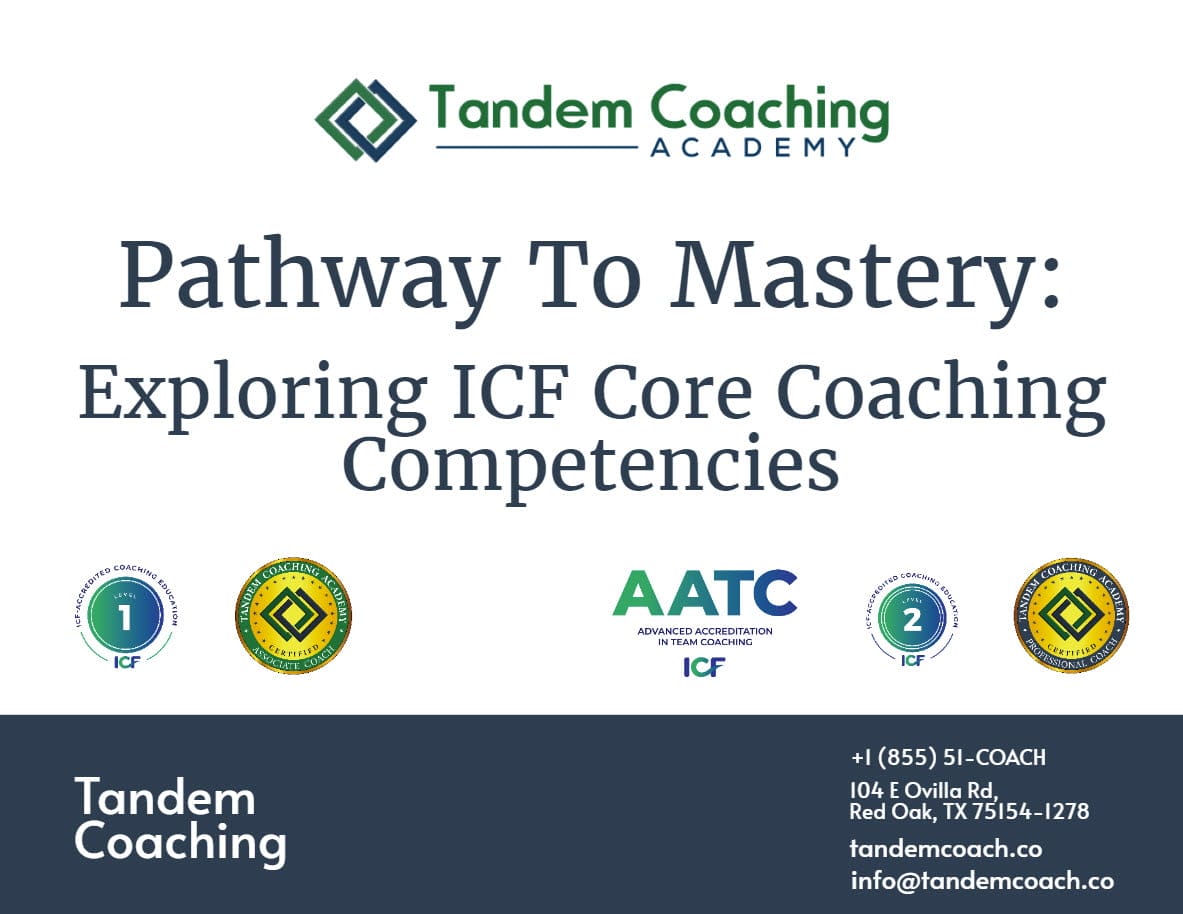In this blog post, we delve into Competency 5: Maintains Presence, as defined by the International Coaching Federation (ICF). The ICF defines coaching presence as the ability to be fully conscious and create a spontaneous relationship with the client, employing a style that is open, flexible, grounded, and confident. According to the ICF, a coach with a strong coaching presence can remain present and attuned to the client, providing a supportive environment that allows the client to express themselves freely and engage in the coaching process in a meaningful way. The coach’s presence is foundational in creating trust, enabling deeper exploration, and facilitating the client’s movement towards their desired outcomes. This competency underscores the importance of the coach being fully conscious and present with the client, demonstrating a style that is open, flexible, grounded, and confident. It highlights the essence of a coach’s presence, the backbone of the coaching experience, which is crucial for creating a personalized and effective coaching environment. Demonstrating such presence is an ongoing journey in enhancing coaching skills and client’s experience. By cultivating such presence, a coach can foster a space of mindfulness and self-awareness, enabling both the coach and the client to engage deeply in the coaching process without judgment. This approach not only cultivates trust and safety but also encourages continuous learning and the exploration of valuable insights within the coaching relationship.
ICF Competency 5 Key Markers – Coaching Presence
- Remains focused, observant, empathetic, and responsive to the client.
- Demonstrates curiosity during the coaching process.

Coaching presence begins with being fully present with the client, a crucial skill that master certified coaches excel in. This requires the coach to immerse themselves entirely in the coaching space, setting aside all distractions to focus exclusively on the client and their growth. Achieving full presence allows the coach to understand not just the client’s words, but also the deeper meanings behind them, as communicated through facial expressions, vocal patterns, body language, hand movements, breathing, and eye cues. It prompts questions like: What is the client thinking or feeling? What memories are they recalling? What are they processing? This heightened level of awareness in the moment elevates the coaching relationship, enabling the coach to create a space where the client feels deeply understood and connected, fostering an environment of trust and safety that is conducive to growth and discovery and elevates the entire coaching experience.
When a masterful coach is fully present with the client, engaging in the present moment, they cultivate an empathetic connection that is key to the client’s journey. This presence, characterized by a state of awareness and mindfulness, enables the coach to step into the client’s experience, fostering a space where the client is encouraged to explore and discover insights without judgment. It’s not about the coach’s benefit but rather facilitating the client’s ability to uncover their own path. By adopting a perspective that includes content and context from the client’s world, the coach can identify patterns, inconsistencies, distortions, deletions, generalizations, and limiting beliefs that obstruct the client’s progress. This approach not only deepens the coaching presence but also empowers the client to create solutions and strategies that resonate with their experiences and goals. Through this process, the coach acts not just as a guide but as a partner, helping the client explore their potential in a co-active and personalized user experience.
Being observant and responsive to the client involves more than just active listening; it requires highlighting observed aspects for the client to consider and decide upon. This responsiveness in the coaching conversation necessitates a departure from the coach’s preconceived notions or interpretations of what the client communicates. A coach must remain flexible, attuned to whether their approach is effectively resonating with and advancing the client’s journey. Curiosity plays a crucial role here, a skill that transcends merely listening to and internalizing the client’s words. Instead, it involves inviting the client to engage in mindfulness and self-awareness, encouraging them to analyze their own thoughts, emotions, beliefs, and ideas. This process of curiosity helps the client vocalize and explore their insights, peeling back layers to uncover truths that were always present yet undiscovered. In essence, superior coaching presence—marked by a state of awareness, connectedness, and a larger sense of being—supports the client’s learning and growth by fostering a spaciousness for continuous exploration and discovery.
ICF core competencies form the foundation of powerful coaching. Curious about building this strong foundation and embarking on the path to professional coaching? Our ICF ACC Level 1 coach training program gives you the skills and credentials to excel. Learn more about our program today.
Develop Your Coaching Presence Core Competency – Manage Emotions, Build Confidence
The next two markers that demonstrate a coach’s competence in maintaining coaching presence, as outlined by the International Coaching Federation (ICF), include:
- Managing one’s emotions to remain fully conscious and present with the coachee. This involves employing a style that allows the coach to stay focused and attentive, minimizing personal chatter and distractions to maintain a spontaneous relationship with the client. This mastery of coaching is a hallmark of MCC (Master Certified Coach) level coaching, signifying a deep commitment to being present in every moment with the client.
- Demonstrating confidence in working with strong client emotions throughout the coaching process. A coach’s ability to navigate these emotions without resorting to giving advice, but instead listening deeply and allowing the client to explore their feelings, is a key ingredient in deepening your coaching presence. This competence is not only about being fully conscious and present but also about creating a safe space where the client feels supported and understood, fostering a sense of timelessness and connectedness that characterizes the felt experiences of a profound coaching presence.

These markers underscore the importance of presence as an ongoing journey of self-awareness and mindfulness, where the coach partners with the client to facilitate growth and discovery. Doug Silsbee describes presence as much more than a technique; it’s a state of being that allows coaches to effectively mentor and guide their clients, offering a personalized user experience that respects the client’s autonomy and consent to use the shared information for their development.
Contrary to common misconceptions, coaching sessions often involve tears and a spectrum of emotions, including fear, anger, frustration, joy, anticipation, hurt, and excitement. Professional coaching embraces the whole person, transcending the mere rational and logical aspects. It’s crucial for coaches to be fully conscious and present, creating a safe and supportive space that allows clients to process their emotions. This represents a cornerstone of the coaching experience, enhancing the overall effect of being fully conscious and present. This approach is key to uncovering and addressing the root of faulty thinking.
Master coaches understand the importance of allowing clients the room to experience their emotions without judgment. If a coach reacts uncomfortably to a client’s strong emotions, it may inadvertently signal a desire to avoid these feelings, rather than providing the necessary support. Offering a tissue at the first sign of tears, for example, might imply a discomfort with the client’s emotional expression, rather than an act of empathy. The goal is to facilitate a space where emotions can be freely expressed and processed, paving the way for healing and progress. This emotional processing is a cornerstone of developing presence in the coaching relationship, ensuring clients feel seen, heard, and valued in their entirety.
When clients express anger or frustration, they aren’t looking for us to soothe them immediately. Instead, they require the space to express their frustrations, allowing them to fully experience their emotions. As coaches, our role is to facilitate this process, engaging with them through thoughtful questioning and observations that assist in processing these feelings for their growth. This approach emphasizes the importance of coaches being fully conscious and in control of their own emotions. The crucial aspect is identifying which emotions we find uncomfortable and developing a tolerance for experiencing these emotions alongside our clients, from a stance that is neutral yet filled with empathy. This capacity to hold space for clients’ emotions without judgment is what deepens the coaching presence, fostering a safe environment where clients feel understood. Ultimately, this approach lays the foundation for a deeper connection and a stronger coach-client relationship, embodying the essence of being present in the moment and partnering with the client in their journey.
It’s important to note that coaching is distinct from therapy. While coaching can involve navigating incidental emotions that arise in the context of personal or professional development, it is not equipped to address deep-seated psychological wounds or ongoing mental health issues such as chronic depression. Such matters often require the specialized expertise found in therapy or counseling. Ethically, coaches have a responsibility to recognize the limits of their practice and make appropriate referrals to other professionals when a client’s needs surpass the scope of coaching. This discernment is a key aspect of a coach’s competence, ensuring that clients receive the most appropriate and effective support for all aspects of their well-being.

Unlock Your Coaching Potential with Tandem!
Dive into the essence of effective coaching with our exclusive brochure, meticulously crafted to help you master the ICF Core Coaching Competencies. Tandem Coaching Academy offers a unique perspective that enriches these competencies, empowering you to elevate your coaching skills and achieve profound success. Sign up now to receive your detailed guide complete with insightful infographics that bring clarity and direction to your coaching journey.
Power of Silence and Present-Moment Awareness
The essence of coaching lies in the realization that, as a coach, you don’t need to possess all the knowledge that the client holds. This understanding underscores the distinction between “doing” and “being” within the coaching realm. In any given coaching session, it’s not necessary to grasp every detail, satisfy every curiosity, or fully comprehend the client’s domain and context to facilitate their progress. Embracing the client as a creative, resourceful, and whole entity allows for a trust-based relationship where the client’s self-awareness and understanding of their details are paramount.

We, as coaches, provide a framework and process that empowers the client in “doing” the work necessary to navigate their challenges, questions, concerns, desires, and actions. This approach shifts the focus from the coach needing full context to being fully conscious and present, enhancing our listening skills to engage deeply with the client’s expressions. The coaching presence means creating a space characterized by the felt experiences of timelessness, where the client is encouraged to explore their awareness further.
In this dynamic, the coach’s role is not to solve problems but to facilitate a process that helps the client become more self-aware and capable of addressing their own issues. This distinction is crucial as it aligns with the ICF’s definitions around coaching competencies, particularly Competency 4, which emphasizes being fully conscious and creating a supportive environment for the client. Thus, coaching is an ongoing journey of presence, where the coach and the client collaboratively explore and unlock potential. Facilitating client awareness necessitates granting them the space for introspection and self-discovery. Within the coaching context, silence emerges as a pivotal skill, standing alongside listening on a deeper level and effective questioning as the three core competencies that define a coach’s presence. Silence transcends mere absence of speech; it represents a conscious choice to create an environment conducive to the client’s reflection and processing.
Understanding when to engage and when to offer silence for the client’s advantage is a testament to a coach’s mastery. Indications of a client’s need for silence can be subtle, such as their gaze drifting upward, sideways, or downward, signaling moments of contemplation, recollection, or mental processing. These cues suggest it’s time for the coach to pause, providing the client with the necessary temporal spaciousness to explore their thoughts and feelings.
Similarly, a lack of response to a coach’s question often doesn’t signal confusion but rather a deep engagement with the inquiry, requiring time to articulate a thoughtful response. Recognizing and respecting these moments of silence allows the client to delve into deeper layers of understanding, illustrating the profound impact of presence as an ongoing practice in coaching. This approach aligns with the coaching presence, meaning to stay present and fully conscious, thereby facilitating a more meaningful and productive coaching journey.
This moment calls for restraint rather than intervention. It’s not an opportunity to rephrase the question, provide clarifications, or showcase the extent of your coaching prowess. The essence of coaching presence here is to remain fully conscious, present, and silent alongside the client. Trusting in the client’s innate creativity, resourcefulness, and wholeness is fundamental; they possess the insight to seek clarification or express their needs if they find the question unclear or misaligned.
Are you eager to magnify the impact of your coaching practice? Our ICF Team Competencies program offers a seamless transition for those who have mastered the core competencies, allowing you to delve deeper into the complexities and rewards of team coaching. Explore this opportunity today.

Silence serves as a bridge to deeper understanding and connection, allowing the client space to internally process their thoughts and emotions. If a client pauses and looks away, it’s a signal they are still engaged in thought, not an indication they’ve concluded their response. Interrupting this process can disrupt their flow of thought and self-exploration. Therefore, patience becomes a virtue, emphasizing the coaching competency of being rather than doing, facilitating a coaching environment where the client feels supported in their journey of self-discovery at their own pace.
Embracing silence and adopting a slower rhythm in the coaching dialogue invites a more profound exploration and realization for the client. This approach underscores the significance of presence as an ongoing commitment in coaching, characterized by the felt experiences of timelessness and the spaciousness to allow for genuine growth and insight.
Creating space for the client extends to the moments between their responses and your inquiries. Hastily following up a client’s answer with another question can inadvertently communicate a lack of attentiveness. It suggests that, rather than engaging with the client’s words, the coach is preoccupied with their own agenda. True listening involves absorbing the entirety of the client’s message. After they have spoken, pausing—taking a moment to breathe and reflect—allows the coach to formulate a thoughtful, relevant question that builds on the dialogue meaningfully.
Embracing this pause is a testament to a coach’s presence, illustrating a deep commitment to being fully conscious and present in the interaction. This space and silence are not just empty gaps; they are rich with potential for insight and connection. Both the coach and the client benefit from this processing time, making the coaching journey more effective and transformative. This practice underscores the importance of presence as an ongoing discipline in coaching, one that fosters a deeper, more resonant engagement with the client.
The mastery of Competency 5, Maintaining Presence, as defined by the International Coaching Federation, is the artful balance between action and reflection, speaking and silence, inquiry and empathy. It is an intricate dance where the coach is fully conscious and present, gifting the client with the space to explore the depths of their thoughts and emotions without interference or judgment. This sophisticated skill set is not about shining the spotlight on the coach’s expertise, but rather illuminating the path for the client to tread, guided by their innate creativity, resourcefulness, and wholeness. In this sanctuary of trust and understanding, true transformation begins.
Master coaches are choreographers of silence, carefully reading non-verbal cues and holding back their questions to allow clients the time to process and learn. They understand that presence is much more than a backdrop; it is an active, dynamic state characterized by deep listening skills and the felt experiences of timelessness. By resisting the urge to fill every moment with words, coaches create an atmosphere where meaningful insights can surface. These moments of spaciousness give life to coaching sessions, enabling clients to unlock their potential in ways that are profound and lasting. Through steadfast commitment to this competency, coaches not only facilitate self-discovery and awareness but also cultivate the soil for sustainable growth and lasting change.
Discover Your Coaching Tribe
Accelerate your coaching journey! Connect with fellow coaches who are constantly elevating their skills, exchanging insights, and pushing each other to excel. Join our community today.












